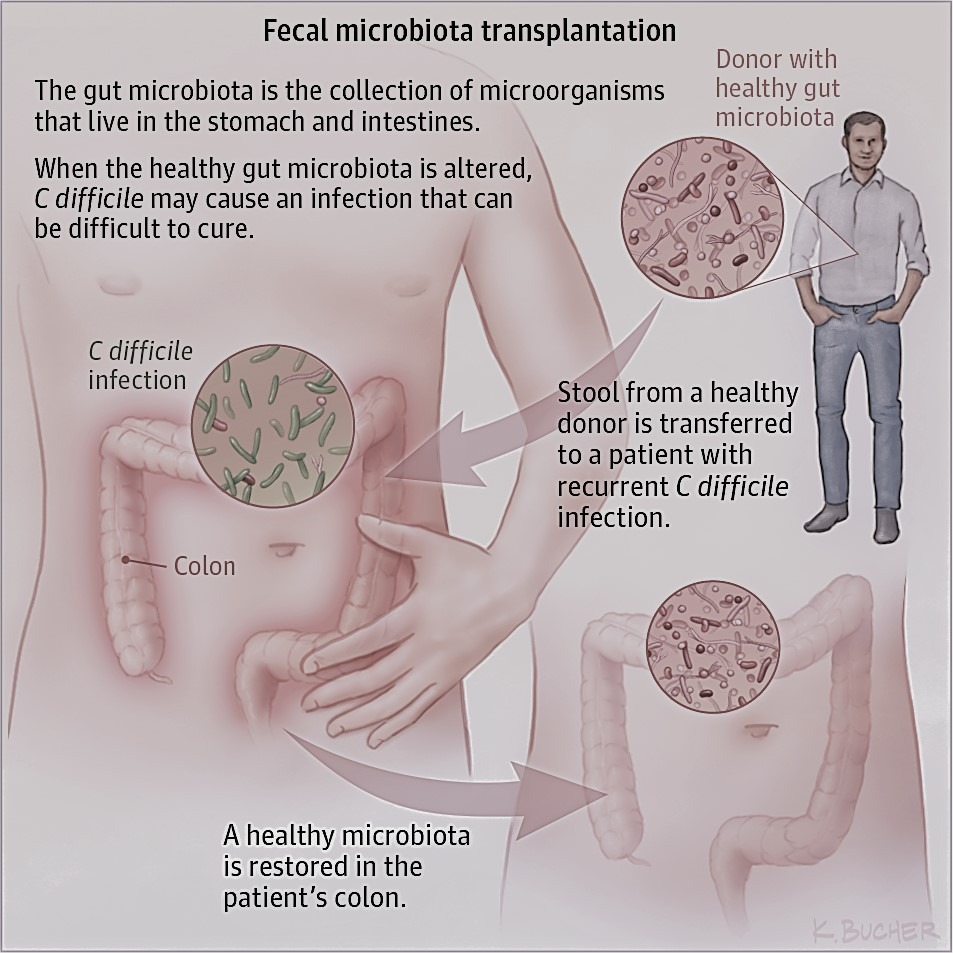Facts
Did you know our guts are host to a community of trillions of bacteria.
In the last decade, new discoveries have shown that these bacteria play a fundamental role in our health. These include, among others, regulation of our immune systems, metabolic function, and even mental health and behavior.
This new field of medicine is creating opportunities to treat some of the leading causes of disease worldwide such as Inflammatory bowel disease (Crohn’s disease and Ulcerative colitis), SIBO, c. diff colitis, malnutrition, and infectious diarrhea, for instance.
Fecal transplantation has been used effectively to prevent or reverse these diseases.
How Does It Work?
The diverse composition of microbes in our guts is essential to our general health and well-being. Any disruption to this balance can lead to illness. In particular, antibiotic use disrupts this balance and makes us susceptible to infection from opportunistic microbes such as C. difficile.
C. diff is prevalent in the general population and can exist in our bodies without issue. It is when certain conditions prevail, that the bacteria produce a toxin that will cause illness. Symptoms may include fever, abdominal cramps, and watery diarrhea and in severe cases can be life threatening requiring hospitalization and urgent surgery.
Antibiotics often upset the balance of the many bacteria that normally live in our colons. When the numbers of healthy bacteria decrease, often because of antibiotic use, harmful Clostridium difficile bacteria may proliferate and cause symptoms.
So What Is Fecal Transplantation or FMT
Fecal Transplantation or FMT involves transplanting stool from healthy donors. This helps restore the balance of healthy bacteria and helps clear infection. Fecal transplantation is used for difficult-to-treat or recurrent Clostridium difficile infection with excellent success rate.
In fact, it is so successful that based on the currently available evidence, medical professional societies have advocated fecal transplantation as standard of care for patients with recurrent C. difficile infection or those who have not responded to standard therapies. Harvard Health Publishing (HHP), the consumer health education division of Harvard Medical School, recently described stool transplants as now standard of care for recurrent C. difficile infections
But while supported by guidelines, FMT is still considered investigational and is not currently FDA-approved. However, the FDA has allowed clinicians to provide Fecal Transplantation to treat recurrent c. diff infection or infection that did not respond to other treatments.
How is Fecal Transplantation Performed ?
There are several ways to complete the procedure. In our practice, a colonoscope typically is used to transplant carefully screened, processed stool from a healthy donor into a sick patient’s colon. The donor stool is typically provided by a stool bank, the largest of which is OpenBiome. OpenBiome provides us with prescreened donor stool, checked for potentially disease-causing organisms. The stool arrives frozen and is instilled in your gastrointestinal tract during the fecal transplantation procedure. You should expect results fairly quickly as your gut bacteria balance is restored.

At Colorectal Consultants, we have utilized this technique with excellent clinical results thus far.
What Should You Do: Three Easy Steps to a Healthy Colon
Here are the Three Steps for a successful FMT- Fecal Transplant outcome:
- CALL and make an appointment. During your initial consultation, our doctor will determine your eligibility for the procedure, explain your options in detail, and answer all your questions.
- FOLLOW the instructions provided carefully and PREPARE for your procedure as instructed during your consultation visit.
- SHOW UP at the facility where the procedure is scheduled to be performed.
That’s all. In most cases, you should expect a significant overall improvement in your symptoms. It’s that easy!
If you suffer from recurrent C. difficile infection and have not responded to standard therapies, please schedule an appointment to learn if you are a suitable candidate for fecal transplantation.